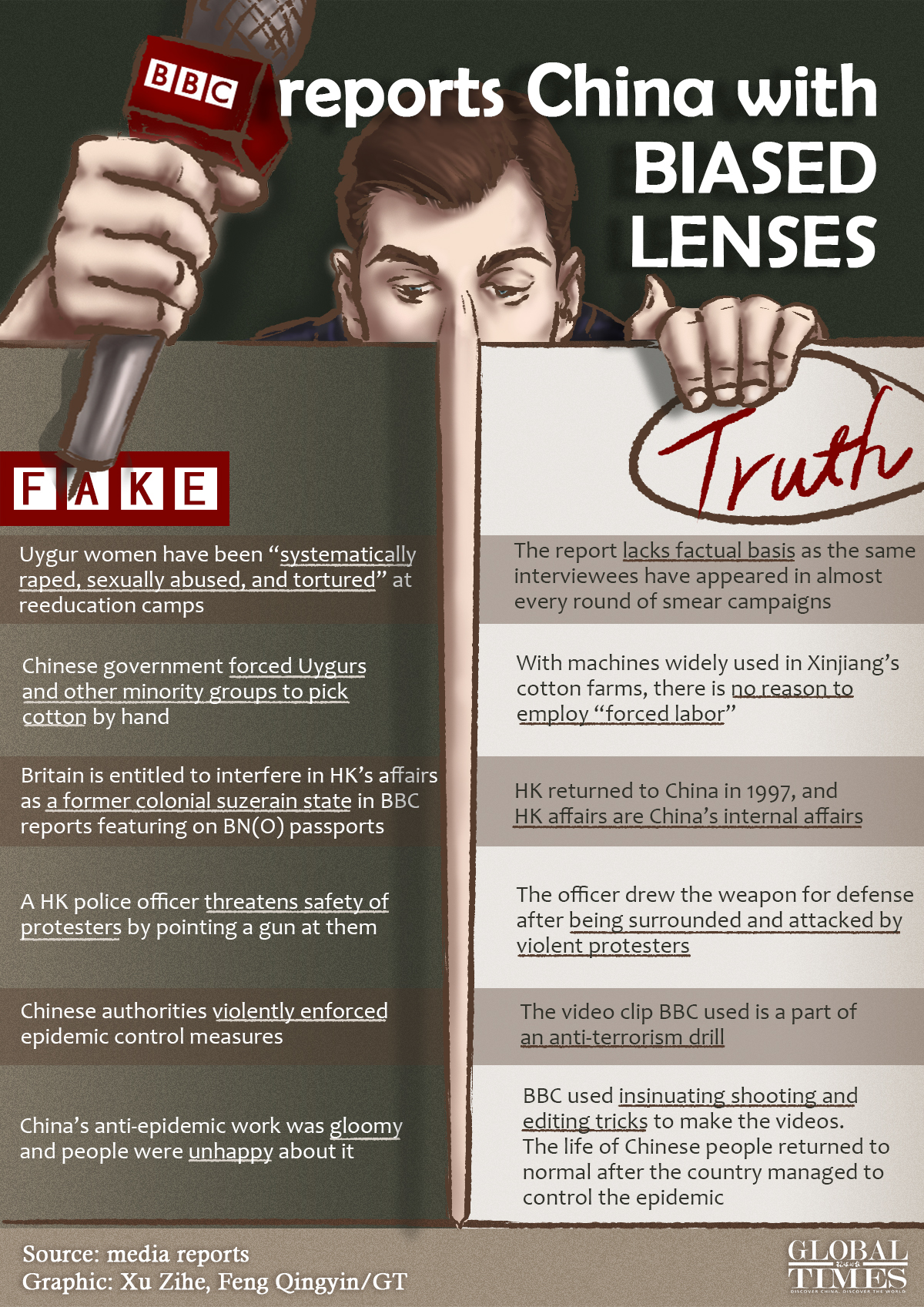
How does the BBC apply "results before evidence" principles when reporting on China? Graphic: Xu Zihe, Feng Qingyin/GT
China has sent the outside world a clear signal that it has zero tolerance for fake news Friday by barring BBC World News from airing in China. The decision comes as no surprise. According to the National Radio and Television Administration, BBC World News has been banned as some BBC's reports on China infringed the principles of truthfulness and impartiality in journalism.
For quite a while, BBC has been no longer a news organization that upholds objective reporting, but has degraded into a rumor mill with no bottom line. It's fair to say it has become a vanguard in the West in concocting and spreading rumors and lies about China. BBC also views almost everything concerning China with double standards. And now, it is paying the price for what it has done.
Let's have a look at how BBC twists facts and fabricates stories about China. It portrayed Hong Kong street violence as a "pro-democracy" movement, and to a certain extent, even glorified rioters and their violence. After US President Donald Trump's supporters stormed the Capitol on January 6, BBC reporters including Grace Tsoi who defended the Hong Kong rioters rushed to criticize US rioters, vividly showing what double standard is.
In a recent article, it accused China's measures that encourage people to stay put to celebrate the Lunar New Year, which is not mandatory, of being a "clampdown" on Chinese people, not to mention its many reports that smeared China's lockdown measures as suppression of human rights after the epidemic broke out in China last year.
It stooped to a new low earlier this month when it published a sensational story alleging Uygur women were "systematically raped, sexually abused, and tortured" in the vocational education and training centers in China's Xinjiang Uygur Autonomous Region, only citing oral dictations of individual Uygur women without any verification. Is this what a media supposed to report on facts and truths should do? Where are BBC reporters' news ethics?
BBC is carrying out a public opinion crusade against China. It has become a propaganda tool for secessionist and separatist forces of China, threatening China's national security with false reports. In order to serve those secessionists, it has taken a preset position to make selective reports, degrading into a rumor mill. Given such, China has every reason to take actions against it. China's punishment on the British broadcaster is reasonable. If we don't respond, it will mean we tolerate anyone to discredit us in this way. China must teach BBC a lesson.
It must be pointed out that banning BBC World News has nothing to do with freedom of the press. Does the so-called freedom of the press the West advocates mean media outlets are free to produce lies and launch politically motivated suppression against a target while being immune from any punishments? If so, China doesn't need such freedom of the press. The Western media has no moral high ground to criticize China over freedom of the press.
China is not as bad as BBC has portrayed. Just make a comparison of the performances of China and the UK in face of the pandemic. Those BBC reporters who portrayed China as "a living hell" while fabricating the West as "a paradise for human rights" should feel ashamed of themselves. The reality is, some British people who evacuated from China to the UK last year after the outbreak of the epidemic are wishing they would have stayed in China.
Because of its false reports and smears against China, BBC's credibility is declining sharply with Chinese people. Quite a few Chinese people now feel disdain for the broadcaster. BBC's reports on China's epidemic prevention and Xinjiang in particular often draw ridicule from China's netizens.
BBC has chosen to be a rumormonger against China, then it has to bear the consequences.
The author is a reporter with the Global Times. opinion@globaltimes.com.cn




